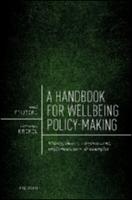A Handbook for Wellbeing Policy-Making
History, Theory, Measurement, Implementation, and Examples
| dc.contributor.author | Frijters, Paul | |
| dc.contributor.author | Krekel, Christian | |
| dc.date.accessioned | 2023-01-20T11:21:15Z | |
| dc.date.available | 2023-01-20T11:21:15Z | |
| dc.date.issued | 2021 | |
| dc.identifier.uri | https://library.oapen.org/handle/20.500.12657/60760 | |
| dc.description.abstract | Around the world, governments are starting to directly measure the subjective wellbeing of their citizens and to use it for policy evaluation and appraisal. What would happen if a country were to move from using GDP to using subjective wellbeing as the primary metric for measuring economic and societal progress? Would policy priorities change? Would we continue to care about economic growth? What role would different government institutions play in such a scenario? And, most importantly, how could this be implemented in daily practice, for example in policy evaluations and appraisals of government analysts, or in political agenda-setting at the top level? This book provides answers to these questions from a conceptual to a technical level by showing how direct measures of subjective wellbeing can be used for policy evaluation and appraisal, either complementary in the short run or even entirely in the long run. It gives a brief history of the idea that governments should care about the happiness of their citizens, provides theories, makes suggestions for direct measurement, derives technical standards, shows how to conduct wellbeing cost-effectiveness and cost-benefit analyses, and gives examples of how real-world policy evaluations and appraisals would change if they were based on subjective wellbeing. In doing so, the book serves the growing interest of governments as well as non-governmental and international organizations in how to put subjective wellbeing metrics into policy practice. | en_US |
| dc.language | English | en_US |
| dc.subject.classification | thema EDItEUR::K Economics, Finance, Business and Management::KC Economics::KCV Economics of specific sectors::KCVK Welfare economics | en_US |
| dc.subject.classification | thema EDItEUR::K Economics, Finance, Business and Management::KC Economics::KCV Economics of specific sectors::KCVJ Health economics | en_US |
| dc.subject.classification | thema EDItEUR::K Economics, Finance, Business and Management::KC Economics::KCP Political economy | en_US |
| dc.subject.classification | thema EDItEUR::K Economics, Finance, Business and Management::KC Economics::KCG Economic growth | en_US |
| dc.subject.other | subjective wellbeing, public policy, policy evaluation, policy appraisal, cost-effectiveness analysis, cost-benefit analysis | en_US |
| dc.title | A Handbook for Wellbeing Policy-Making | en_US |
| dc.title.alternative | History, Theory, Measurement, Implementation, and Examples | en_US |
| dc.type | book | |
| oapen.identifier.doi | 10.1093/oso/9780192896803.001.0001 | en_US |
| oapen.relation.isPublishedBy | b9501915-cdee-4f2a-8030-9c0b187854b2 | en_US |
| oapen.relation.isFundedBy | 7686d2e3-7664-45eb-84d6-20eb8c4e1afa | en_US |
| oapen.pages | 454 | en_US |
| oapen.place.publication | Oxford | en_US |

